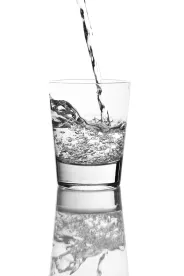We often cover cases in which false advertising claims brought under state law are challenged as preempted by a federal regulatory scheme. Poland Spring was a recent target of state law false advertising claims, and successfully obtained the dismissal of those claims on the ground that they were preempted by federal statute. Patane v. Nestle Waters N. Am., 2018 WL 2271161 (D. Conn. May 17, 2018).
In consolidated actions, putative class action plaintiffs alleged that Poland Spring water is not actually 100% “spring water” as defined under the Food, Drug and Cosmetics Act (FDCA). The Food & Drug Administration’s regulations define spring water as “deriv[ing] from an underground formation from which water flows naturally to the surface of the earth,” with a “natural force causing the water to flow to the surface through a natural orifice.” The water may be collected by a tap and with an external hydraulic force, so long as the water has all the physical properties of the water that naturally flows to the surface, and so long as the water is collected by a “hydrogeologically valid method.” Since the FDCA does not provide a private right of action for the violation of the regulations in question, plaintiffs asserted fraud, breach of contract, and consumer deception claims under various state laws.
The district court (Judge Jeffrey A. Meyer) held that plaintiffs’ claims were preempted by § 337(a) of the FDCA, which provides that only the federal government—not private parties—may enforce FDCA violations. According to the court, § 337(a) impliedly preempts any claim under state law based solely on a violation of the FDCA. Plaintiffs’ principal complaint was that Poland Spring did not comply with the FDA’s standards for spring water, and plaintiffs tellingly proclaimed that they sought to enforce those standards in the FDA’s stead. Since all claims for relief hinged on the alleged non-compliance with FDA standards, all claims were dismissed as impliedly preempted.
Plaintiffs were given leave to replead any proper state claims that are not preempted. Though not essential to its holding, the court also expounded upon § 343–1(a)(1) of the FDCA, which expressly preempts any state law from imposing any definition of “spring water” that is not identical to the FDCA definition. According to the court, implied preemption under § 337(a) and express preemption under § 343–1(a)(1) result in a broad preemptive effect under which only a narrow range of state law claims can survive: “In order to survive preemption, a state law claim must rely on an independent state law duty that parallels or mirrors the FDCA’s requirement for ‘spring water,’ but must not solely and exclusively rely on violations of the FDCA’s own requirements.” Given the court’s dicta on the combined effect of express and implied preemption, if plaintiffs’ claims in their amended pleadings are again preempted, we might expect dismissal with prejudice. Watch this space for further developments.




 />i
/>i

